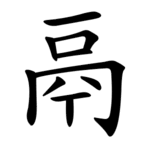| 鬲 | ||
|---|---|---|
| ||
| 鬲 (U+9B32) "cauldron, tripod" | ||
| Pronunciations | ||
| Pinyin: | lì | |
| Bopomofo: | ㄌㄧˋ | |
| Wade–Giles: | li4 | |
| Cantonese Yale: | gaak3, lik6 | |
| Jyutping: | gaak3, lik6 | |
| Japanese Kana: | レキ reki (on'yomi) かなえ kanae (kun'yomi) | |
| Sino-Korean: | 력 ryeok | |
| Hán-Việt: | cách | |
| Names | ||
| Japanese name(s): | 鬲/かなえ kanae | |
| Hangul: | 다리 굽은 솥 dari gubeun sot | |
| Stroke order animation | ||
 | ||
Radical 193 or radical cauldron (鬲部) meaning "cauldron" or "tripod" is one of the 8 Kangxi radicals (214 radicals in total) composed of 10 strokes.
In the Kangxi Dictionary, there are 73 characters (out of 49,030) to be found under this radical.
鬲 is also the 189th indexing component in the Table of Indexing Chinese Character Components predominantly adopted by Simplified Chinese dictionaries published in mainland China.
Evolution
 Oracle bone script character
Oracle bone script character Bronze script character
Bronze script character Large seal script character
Large seal script character Small seal script character
Small seal script character
Derived characters
| Strokes | Characters |
|---|---|
| +0 | 鬲 |
| +6 | 鬳 |
| +7 | 鬴 |
| +8 | 鬵 鬶SC (=鬹) |
| +9 | 鬷 |
| +10 | 鬸 |
| +11 | 鬹 鬺 |
| +12 | 鬻 |
Variant forms
.svg.png.webp) Standard form in Japanese and Korean
Standard form in Japanese and Korean
Alternative form in Traditional Chinese.svg.png.webp) Standard form in Traditional Chinese and Simplified Chinese
Standard form in Traditional Chinese and Simplified Chinese.svg.png.webp) Alternative form
Alternative form
Literature
- Fazzioli, Edoardo (1987). Chinese calligraphy : from pictograph to ideogram : the history of 214 essential Chinese/Japanese characters. calligraphy by Rebecca Hon Ko. New York: Abbeville Press. ISBN 0-89659-774-1.
See also
External links
Wikimedia Commons has media related to Radical 193.
This article is issued from Wikipedia. The text is licensed under Creative Commons - Attribution - Sharealike. Additional terms may apply for the media files.